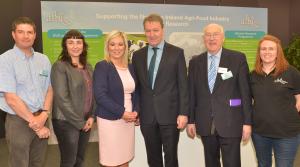AFBI at the Balmoral Show 2015
Date published:
The Agri-Food and Biosciences Institute (AFBI) highlighted its scientific work that has underpinned Northern Ireland’s successful application to the European Commission for the new (2015-2016) Nitrates Action Programme at Balmoral 2015. AFBI’s exhibit also included the importance of controlling BVD (bovine virus diarrhoea) virus infection in local herds.

BVD Testing
BVD infection is an important cause of economic loss in cattle herds. AFBI commenced a commercial testing programme for this virus in 2007 under AFBI’s Cattle Health Scheme. In 2013, Animal Health and Welfare Northern Ireland (AHWNI) initiated an industry-led voluntary BVD eradication scheme which has been taken up by many herdowners. AFBI is one of the designated laboratories for the testing of samples collected under AHWNI’s scheme.
AHWNI’s programme is based on the testing of ear notch samples collected by farmers as part of the official tagging process. It is designed to identify calves persistently infected (PI) with BVD virus as soon as possible after birth to stop them spreading the infection to other members of the herd.
In addition to using the latest molecular technologies to provide fast, accurate results that are reported by qualified vets who are available for consultation, AFBI is providing advice and support for the industry-led programme at different levels. AFBI’s research has improved the local knowledge on BVD and has influenced the design of the BVD eradication programme.
Nitrates Research
AFBI research has delivered improvements to Northern Ireland’s Nitrates Action Programme (NAP) – benefitting both farmers and the environment. Because of AFBI research, not only will the environment be PROTECTED, but farmers in Northern Ireland will also BENEFIT under the new (2015-2019) Nitrates Action Programme (NAP).
In the run-up to the latest NAP review, the European Commission (EC) indicated that the closed period for slurry application may need to be extended into March to reduce the risk of water pollution. Such an extension would have required an extra 4-6 weeks slurry storage capacity on many farms and cost the industry up to £40 million. Strategic research by AFBI, however, demonstrated that Northern Ireland farmers take a responsible approach to manure management, and apply only about 10% of slurry in February and the remainder during the growing season. As a result, the EC agreed that the closed period could remain unchanged (15th Oct – 31st Jan) in the new NAP regulations. Good news for the livestock industry!
In recent years, farmers have expressed concern that phosphorus (P) recommendations for grassland in the lower half of the P index 2 range are too low and are potentially reducing grass yields. AFBI research confirmed that this was indeed the case. Accordingly, in the new NAP and Phosphorus Regulations, P index 2 for grassland soils has been split into “2-“ and “2+” categories, and higher P recommendations have been assigned to grassland in the P index “2-“ category to alleviate P deficiency and prevent up to £10 million worth of lost grass production. Good news for grassland farmers!
When Northern Ireland’s NAP was introduced in 2006, the EC insisted that the availability of P in organic manures should be fixed at 100% - i.e. double what it really is. Because farmers here can only apply fertilizer P to land to make up a crop requirement unmet by organic manures, and because they have to assume that manure P is 100% available, they may not in fact be able to apply sufficient P to meet crop requirements on land of low P status (i.e. P index 0 and 1). Based on AFBI’s independent research, a strong case was therefore made to the EC that slurry P availability should be set at 50% for soils at either P index “0” or “1”. This case was accepted. Farmers can now apply fertilizer and manure P to fully meet crop requirements on low P soils, and what’s more farmers now have better opportunity to redistribute manure away from high P soils and onto P-impoverished land. Good news for the farming industry and the environment!
Cereal growers in Northern Ireland have been concerned that RB209 N recommendations often restrict the yield of winter wheat and, to a lesser extent, the yields of other cereal crops. Research by AFBI has verified that this was the case, and based on this research, it was proposed that “Nmax” and standard yields should be introduced for each cereal crop, with the option of increasing N inputs where evidence existed of higher than standard yields. These proposals were approved by the EC and included in the NAP, and should lead to improved grain production in Northern Ireland. Good news for cereal growers!
Without AFBI research, Northern Ireland farmers could face generalized (non-region specific) and more restrictive NAP regulations and would no longer be able to seek a derogation, resulting in increased costs on farm.
Notes to editors:
AFBI carries out high quality technology research and development, statutory, analytical, and diagnostic testing functions for DARD and other Government departments, public bodies and commercial companies. AFBI's Vision is “Scientific excellence in Northern Ireland … serving the world”.All media enquiries to AFBI Press Office